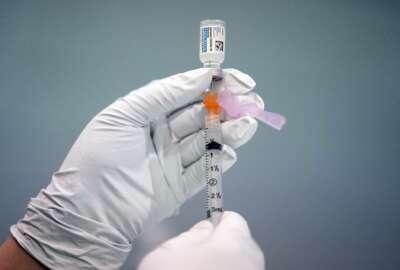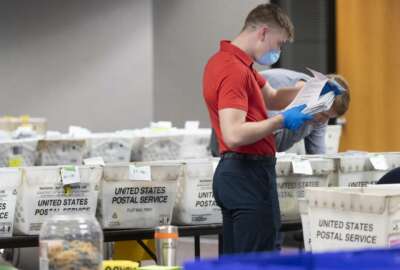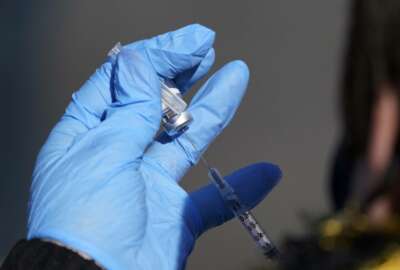Feds could face prosecution, discipline for lying on new vaccine certification form
Agencies are being told to collect certifications about employees' and on-site contractors' vaccination status on a new standardized form. Those who decline to...
Federal employees could face criminal penalties, as well as disciplinary action from their own agencies, if they lie about their vaccination status, according to admonitions on a new standardized vaccine attestation form and an updated list of frequently asked questions the Biden administration issued Friday.
Contractors working in federal facilities, who will also be asked for their vaccination status, could also be in criminal jeopardy. The FAQs warn it’s a federal crime for “anyone” to provide false information on the form, and doing so “could also affect continuing eligibility for access to classified information or for employment in a national security position under applicable adjudicative guidelines.”
The federal statute in question carries a potential prison term of up to five years for anyone convicted of making false statements.
The new certification form gives workers four choices: Certify that they’re fully-vaccinated; that they’re partially vaccinated; that they’re unvaccinated; or that they decline to answer. Declining to answer won’t be interpreted as providing false information, the administration said.
But those who decline to answer will have to be treated as though they’re unvaccinated. Both categories of people will have to wear masks at all times while they’re in federal facilities, and will also need to undergo testing for COVID-19 once or twice a week.
Friday’s updated guidance did not provide a clear timeframe for when agencies should start using the new form, nor did it give a deadline for when employees must make the certifications.
In all cases, agencies are being told to designate an official that employees should return the form to. The administration noted that in most cases, agencies already have records systems in place that are approved to store employee health information.
However, since that’s not the case with contractors, they won’t need to return the form to anyone — at least for the time being. Instead, they’ll be asked to fill it out — but keep it with them at all times.
“They may be asked to show the form upon entry to a federal building or federally-controlled indoor worksite and to a federal employee who oversees their work,” according to the FAQs developed by the Safer Federal Workforce Task Force. “Onsite contractors who are not fully vaccinated (or who decline to disclose vaccination status) will either be enrolled in the agency’s testing program or required to show proof of a negative COVID-19 test result from within the previous three days before entry to a federal building or federally controlled indoor worksite.”
There are some exceptions that would keep some people from having to certify their status. For instance, if, like military members and many Department of Veterans Affairs staff, an employee was vaccinated by the agency itself, there’s already a record – and there’s no reason to collect that information a second time, according to the administration.
Also, members of the public who are entering a federal building solely to obtain “a public service or benefit” won’t need to be asked about their vaccination status. But agencies should tell them that they need to wear masks and physically distance if they’re not vaccinated, according to Friday’s update.
For now, contractors will only need to submit the form if they’re working in a federal facility. But federal employees will have to do so no matter where they’re working — even if they’re teleworking full-time. Also, federal workers who are visiting another agency will have to sign a new form, even if they’ve already certified their vaccination status to their own agency.
Copyright © 2025 Federal News Network. All rights reserved. This website is not intended for users located within the European Economic Area.
Jared Serbu is deputy editor of Federal News Network and reports on the Defense Department’s contracting, legislative, workforce and IT issues.
Follow @jserbuWFED






